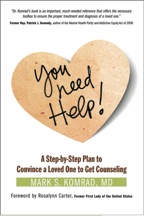“You Need Help! “ by psychiatrist Mark S. Komrad, M.D. should be read by anyone concerned about a person in their lives who may be exhibiting changes in behavior, excessive or prolonged sadness or anxiety, or thoughts of suicide. Dr. Komrad's easy-to-read book is informed by his experience of more than two decades of medical practice, evaluating and treating people with mental illness. The book provides the steps anyone can follow, and addresses every possible obstacle in convincing the troubled person to see a mental health professional for an evaluation.
His nationally syndicated call-in radio talk show about psychiatry, "Komrad on Call," enabled millions of listeners to better understand mental health issues and the steps to take to help others get the treatment they need, in the interest of improving and even saving lives, with proper diagnosis and treatment. Because of his nationally-recognized expertise, Dr. Komrad is a regular guest on topics in psychiatry and mental health on National Public Radio and on television, and is a sought-after psychiatric consultant to Hollywood film directors, to help them portray mental disorders & psychiatrists more accurately & ethically.
In the book, Dr. Komrad explains when it's time for a professional evaluation-- when our caring efforts aren't helping and the person we care about is clearly gettting worse. He guides us in lessening our hesitation to act, and he helps us to understand what mental illness is, and the reasons someone might be reluctant to get hHe guides us in finding the right mental health professional, and describes what happens in the initial professional evaluation.
He clarifies the best timing and environment for speaking with the ''troubled other'' about going for an evaluation, and what to do, from the most minor to the most coercive measures, if the person refuses. The involuntary evaluation of a mentally ill person and the reader's safety are also addressed. I feel that this section of the book should be mandatory reading for all trainees, fellows, and medical and other health sciences students & professionals, as psychiatrically ill people will more often see non-psychiatric health professionals in an emergency, or at other times, because of stigma. Dr. Komrad goes on to talk about how to be part of the support system and ongoing treatment plan for the individual who has been evaluated and diagnosed with mental illness.
The appendix is packed with many helpful resources; it should be in every professional's arsenal and in every "concerned other's" as well.
Dr. Komrad acknowledges the reader, most often a caring, concerned, courageous other, willing to take the frighening steps to help someone we care about. He makes the reader feel that we are not alone in in our fears & feelings. Throughout the book, Dr. Komrad provides many patient examples to help illustrate possible scenarios in which the reader may find him/herself in this process.
Having founded the campus-wide University of Louisville Student Mental Health Section of the health services, directed the health sciences mental health services, and maintained a small university-affiliated private practice, I have helped thousands of significant others & patients through these steps. Dr. Komrad puts it all together in one easy-to-read book that is packed with many helpful suggestions and resources, which is easily accessible to everyone.
As Rosalynn Carter so wisely states in her foreword, "Helping someone to get a proper assessment by meeting with a mental health professional is vital..."
This is the achieved goal of Dr. Komrad's excellent and clearly written manual to improve and save lives. My recommendation: make it mandatory reading for everyone involved in healthcare, education, government, police, and other professionals; have the book visibly displayed in all school and public libraries and professionals' offices. It should be translated into multiple languages as our worlds become more diverse. I give it my whole-hearted endorsement.
Leah Dickstein M.D.
former Vice-President of the American Psychiatric Association
President of the American Women’s Medical Association
Emeritus Professor of Psychiatry, University of Louisville School of Medicine



